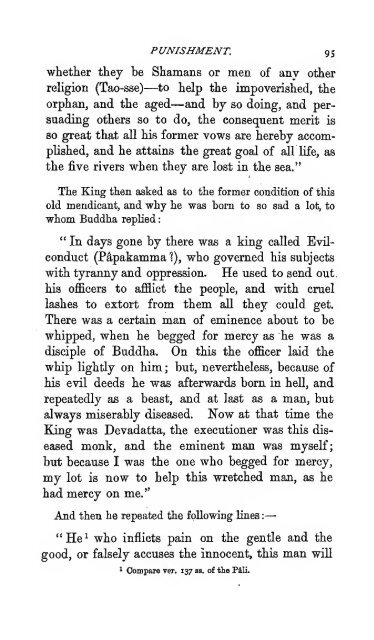Texts from the Buddhist canon : commonly known as Dhammapada
Texts from the Buddhist canon : commonly known as Dhammapada
Texts from the Buddhist canon : commonly known as Dhammapada
You also want an ePaper? Increase the reach of your titles
YUMPU automatically turns print PDFs into web optimized ePapers that Google loves.
:<br />
PUNISHMENT. 95<br />
whe<strong>the</strong>r <strong>the</strong>y be Shamans or men of any o<strong>the</strong>r<br />
religion (Tao-sse)—to help <strong>the</strong> impoverished, <strong>the</strong><br />
orphan, and <strong>the</strong> aged—and by so doing, and per-<br />
suading o<strong>the</strong>rs so to do, <strong>the</strong> consequent merit is<br />
so great that all his former vows are hereby accom-<br />
plished, and he attains <strong>the</strong> great goal of air life, <strong>as</strong><br />
<strong>the</strong> five rivers when <strong>the</strong>y are lost in <strong>the</strong> sea."<br />
The King <strong>the</strong>n <strong>as</strong>ked <strong>as</strong> to <strong>the</strong> former condition of this<br />
old mendicant, and why he w<strong>as</strong> horn to so sad a lot, to<br />
whom Buddha replied<br />
" In days gone by <strong>the</strong>re w<strong>as</strong> a king called Evil-<br />
conduct (P^pakamma V), who governed his subjects<br />
with tyranny and oppression. He used to send out,<br />
his officers to afflict <strong>the</strong> people, and with cruel<br />
l<strong>as</strong>hes to extort <strong>from</strong> <strong>the</strong>m all <strong>the</strong>y could get.<br />
There w<strong>as</strong> a certain man of eminence about to be<br />
whipped, when he begged for mercy <strong>as</strong> he w<strong>as</strong> a<br />
disciple of Buddha. On this <strong>the</strong> officer laid <strong>the</strong><br />
whip lightly on him ; but, never<strong>the</strong>less, because of<br />
his evil deeds he w<strong>as</strong> afterwards born in hell, and<br />
repeatedly <strong>as</strong> a be<strong>as</strong>t, and at l<strong>as</strong>t <strong>as</strong> a man, but<br />
always miserably dise<strong>as</strong>ed. Now at that time <strong>the</strong><br />
King w<strong>as</strong> Devadatta, <strong>the</strong> executioner w<strong>as</strong> this dis-<br />
e<strong>as</strong>ed monk, and <strong>the</strong> eminent man w<strong>as</strong> myself;<br />
but because I w<strong>as</strong> <strong>the</strong> one who begged for mercy,<br />
my lot is now to help this wretched man, <strong>as</strong> he<br />
had mercy on me."<br />
And <strong>the</strong>n he repeated <strong>the</strong> following lines :<br />
" He ^ who inflicts pain on <strong>the</strong> gentle and <strong>the</strong><br />
good, or falsely accuses <strong>the</strong> innocent, this man wiU<br />
' Compare ver. 137 sa. of <strong>the</strong> P41i.<br />
—





